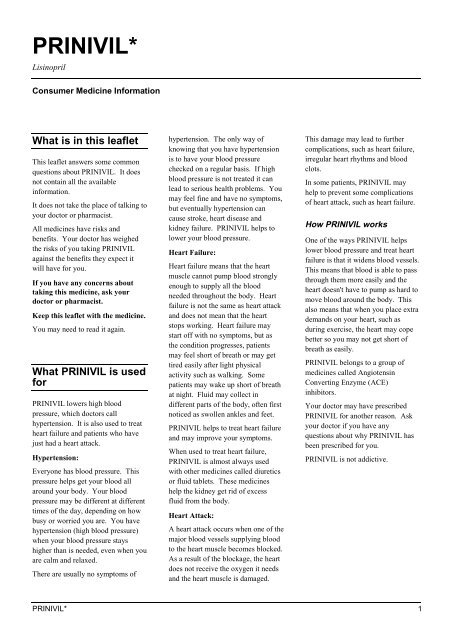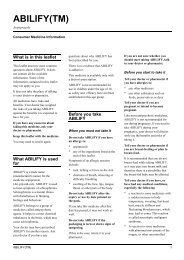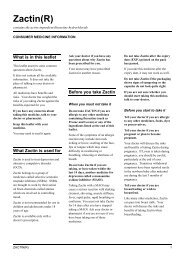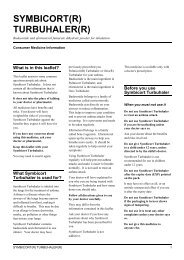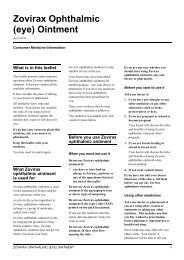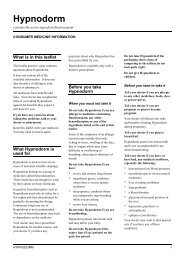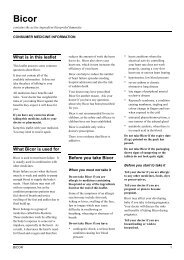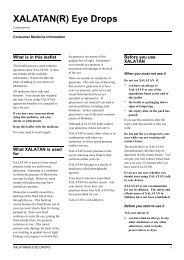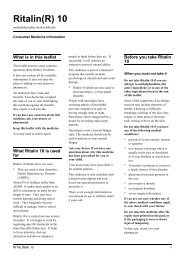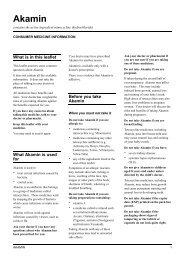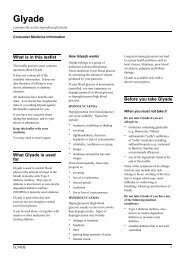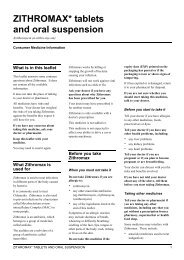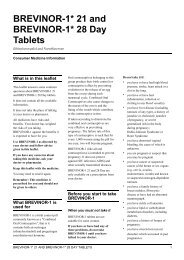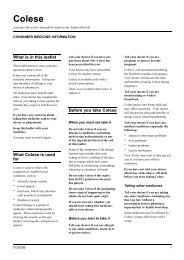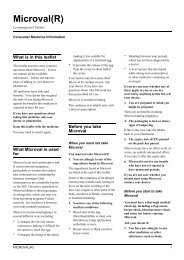PRINIVIL* - Discount Pharmacy Australia
PRINIVIL* - Discount Pharmacy Australia
PRINIVIL* - Discount Pharmacy Australia
Create successful ePaper yourself
Turn your PDF publications into a flip-book with our unique Google optimized e-Paper software.
<strong>PRINIVIL*</strong><br />
Lisinopril<br />
Consumer Medicine Information<br />
What is in this leaflet<br />
This leaflet answers some common<br />
questions about PRINIVIL. It does<br />
not contain all the available<br />
information.<br />
It does not take the place of talking to<br />
your doctor or pharmacist.<br />
All medicines have risks and<br />
benefits. Your doctor has weighed<br />
the risks of you taking PRINIVIL<br />
against the benefits they expect it<br />
will have for you.<br />
If you have any concerns about<br />
taking this medicine, ask your<br />
doctor or pharmacist.<br />
Keep this leaflet with the medicine.<br />
You may need to read it again.<br />
What PRINIVIL is used<br />
for<br />
PRINIVIL lowers high blood<br />
pressure, which doctors call<br />
hypertension. It is also used to treat<br />
heart failure and patients who have<br />
just had a heart attack.<br />
Hypertension:<br />
Everyone has blood pressure. This<br />
pressure helps get your blood all<br />
around your body. Your blood<br />
pressure may be different at different<br />
times of the day, depending on how<br />
busy or worried you are. You have<br />
hypertension (high blood pressure)<br />
when your blood pressure stays<br />
higher than is needed, even when you<br />
are calm and relaxed.<br />
There are usually no symptoms of<br />
hypertension. The only way of<br />
knowing that you have hypertension<br />
is to have your blood pressure<br />
checked on a regular basis. If high<br />
blood pressure is not treated it can<br />
lead to serious health problems. You<br />
may feel fine and have no symptoms,<br />
but eventually hypertension can<br />
cause stroke, heart disease and<br />
kidney failure. PRINIVIL helps to<br />
lower your blood pressure.<br />
Heart Failure:<br />
Heart failure means that the heart<br />
muscle cannot pump blood strongly<br />
enough to supply all the blood<br />
needed throughout the body. Heart<br />
failure is not the same as heart attack<br />
and does not mean that the heart<br />
stops working. Heart failure may<br />
start off with no symptoms, but as<br />
the condition progresses, patients<br />
may feel short of breath or may get<br />
tired easily after light physical<br />
activity such as walking. Some<br />
patients may wake up short of breath<br />
at night. Fluid may collect in<br />
different parts of the body, often first<br />
noticed as swollen ankles and feet.<br />
PRINIVIL helps to treat heart failure<br />
and may improve your symptoms.<br />
When used to treat heart failure,<br />
PRINIVIL is almost always used<br />
with other medicines called diuretics<br />
or fluid tablets. These medicines<br />
help the kidney get rid of excess<br />
fluid from the body.<br />
Heart Attack:<br />
A heart attack occurs when one of the<br />
major blood vessels supplying blood<br />
to the heart muscle becomes blocked.<br />
As a result of the blockage, the heart<br />
does not receive the oxygen it needs<br />
and the heart muscle is damaged.<br />
This damage may lead to further<br />
complications, such as heart failure,<br />
irregular heart rhythms and blood<br />
clots.<br />
In some patients, PRINIVIL may<br />
help to prevent some complications<br />
of heart attack, such as heart failure.<br />
How PRINIVIL works<br />
One of the ways PRINIVIL helps<br />
lower blood pressure and treat heart<br />
failure is that it widens blood vessels.<br />
This means that blood is able to pass<br />
through them more easily and the<br />
heart doesn't have to pump as hard to<br />
move blood around the body. This<br />
also means that when you place extra<br />
demands on your heart, such as<br />
during exercise, the heart may cope<br />
better so you may not get short of<br />
breath as easily.<br />
PRINIVIL belongs to a group of<br />
medicines called Angiotensin<br />
Converting Enzyme (ACE)<br />
inhibitors.<br />
Your doctor may have prescribed<br />
PRINIVIL for another reason. Ask<br />
your doctor if you have any<br />
questions about why PRINIVIL has<br />
been prescribed for you.<br />
PRINIVIL is not addictive.<br />
<strong>PRINIVIL*</strong> 1
Before you take<br />
PRINIVIL<br />
When you must not take it<br />
Do not take PRINIVIL if:<br />
* you have taken any other 'ACE<br />
inhibitor' medicines for high<br />
blood pressure, heart failure or<br />
heart attack before, which<br />
caused your face, lips, tongue,<br />
throat, hands or feet to swell<br />
up, or made it hard for you to<br />
breathe<br />
If you have had an allergic<br />
reaction to an ACE inhibitor<br />
before, you may be allergic to<br />
PRINIVIL.<br />
* you have an allergy to<br />
PRINIVIL or ZestrilTM<br />
(which is another brand of<br />
lisinopril) or any of the<br />
ingredients listed at the end of<br />
this leaflet<br />
Symptoms of an allergic reaction<br />
to PRINIVIL may include skin<br />
rash, itchiness, difficulty<br />
breathing or swallowing, or<br />
swelling of the face, lips, tongue<br />
or throat.<br />
* you have a history of swelling<br />
of the face, lips, tongue, throat,<br />
hands or feet, for no apparent<br />
reason.<br />
Do not take PRINIVIL if:<br />
* you are pregnant or intend to<br />
become pregnant while taking<br />
PRINIVIL<br />
Your baby may absorb this<br />
medicine in the womb and<br />
therefore there is a possibility of<br />
serious harm to the baby.<br />
* you are breast-feeding<br />
Do not take PRINIVIL if:<br />
* the packaging is torn or shows<br />
signs of tampering<br />
* the expiry date on the pack has<br />
passed.<br />
If you take this medicine after the<br />
expiry date has passed, it may not<br />
work.<br />
If you are not sure whether you<br />
should start taking PRINIVIL, talk<br />
to your doctor.<br />
Before you start to take it<br />
Tell your doctor if:<br />
1. you intend to become pregnant<br />
or plan to breast-feed<br />
PRINIVIL should not be used<br />
during pregnancy or while breastfeeding.<br />
2. you have any medical<br />
conditions, especially the<br />
following:<br />
* kidney disease, or are undergoing<br />
dialysis<br />
* liver disease<br />
* low blood pressure, which you<br />
may notice as light-headedness or<br />
dizziness, especially when<br />
standing<br />
* heart problems<br />
3. you are following a very low<br />
salt diet<br />
4. you have had an allergy to any<br />
other medicines or any other<br />
substances, such as foods,<br />
preservatives or dyes.<br />
If you have not told your doctor<br />
about any of the above, tell them<br />
before you take any PRINIVIL.<br />
Taking other medicines<br />
Tell your doctor if you are taking<br />
any other medicines, including<br />
medicines that you buy without a<br />
prescription from your pharmacy,<br />
supermarket or health food shop.<br />
Some medicines and PRINIVIL<br />
may interfere with each other.<br />
These include:<br />
* other medicines used to treat high<br />
blood pressure<br />
* diuretic tablets - also called fluid<br />
or water tablets<br />
* lithium, a medicine used to treat<br />
mood swings and some types of<br />
depression<br />
* potassium tablets<br />
* potassium-containing salt<br />
substitutes<br />
* non-steroidal anti-inflammatory<br />
medicines, such as indomethacin<br />
These medicines may be affected by<br />
PRINIVIL, or may affect how well it<br />
works. You may need to take<br />
different amounts of your medicine,<br />
or you may need to take different<br />
medicines.<br />
Your doctor or pharmacist has more<br />
information on medicines to be<br />
careful with or avoid while taking<br />
PRINIVIL.<br />
How to take PRINIVIL<br />
How much to take<br />
Your doctor will tell you how many<br />
tablets you need to take each day.<br />
The number will depend on your<br />
condition and whether you are taking<br />
other medicines.<br />
Take PRINIVIL only when<br />
prescribed by your doctor.<br />
For high blood pressure:<br />
For most patients, the usual starting<br />
dose is 5 to 10 mg taken once a day.<br />
Some patients may need a lower<br />
starting dose. The dose may need to<br />
be increased depending on your<br />
blood pressure. Most patients take<br />
between 10 to 20 mg each day, taken<br />
once a day.<br />
For heart failure:<br />
The usual starting dose is 2.5 mg<br />
taken once a day. Depending on<br />
your response, this dose may need to<br />
be increased up to 20 mg each day,<br />
taken once a day.<br />
For heart attack:<br />
PRINIVIL may be started within 24<br />
hours of the onset of the symptoms<br />
of heart attack. The usual starting<br />
dose is 5 mg, which is followed 24<br />
hours later by another 5 mg dose.<br />
This is then followed 48 hours later<br />
by a 10 mg dose, and then 10 mg<br />
taken once a day thereafter. Some<br />
patients may need a lower starting<br />
and maintenance dose.<br />
<strong>PRINIVIL*</strong> 2
Follow all directions given to you<br />
by your doctor carefully.<br />
They may differ from the<br />
information contained in this leaflet.<br />
If you do not understand the<br />
instructions on the box, ask your<br />
doctor or pharmacist for help.<br />
How to take it<br />
Take your PRINIVIL at about the<br />
same time each day.<br />
Taking your tablet(s) at the same<br />
time each day will have the best<br />
effect. It will also help you<br />
remember when to take the tablets.<br />
Swallow PRINIVIL with a glass of<br />
water.<br />
It does not matter whether you take<br />
PRINIVIL before or after food.<br />
How long to take it<br />
PRINIVIL helps control your high<br />
blood pressure and helps improve<br />
your heart failure, but does not cure<br />
it. Therefore PRINIVIL must be<br />
taken every day. Continue taking<br />
PRINIVIL for as long as your doctor<br />
prescribes.<br />
If you forget to take it<br />
If it is almost time for your next<br />
dose, skip the dose you missed and<br />
take your next dose when you are<br />
meant to. Otherwise, take it as<br />
soon as you remember, and then go<br />
back to taking your tablet(s) as you<br />
would normally.<br />
If you are not sure whether to skip<br />
the dose, talk to your doctor or<br />
pharmacist.<br />
Do not take a double dose to make<br />
up for the dose that you missed.<br />
If you have trouble remembering<br />
to take your tablets, ask your<br />
pharmacist for some hints.<br />
If you take too much<br />
(overdose)<br />
Immediately telephone your doctor<br />
or Poisons Information Centre<br />
(telephone 13 11 26), or go to<br />
accident and emergency at your<br />
nearest hospital, if you think that<br />
you or anyone else may have taken<br />
too much PRINIVIL. Do this even<br />
if there are no signs of discomfort<br />
or poisoning.<br />
If you take too many tablets, you will<br />
probably feel light-headed or dizzy,<br />
or you may faint.<br />
While you are using<br />
PRINIVIL<br />
Things you must do<br />
Have your blood pressure checked<br />
when your doctor says, to make<br />
sure PRINIVIL is working.<br />
If you feel any light-headedness or<br />
dizziness after you take your first<br />
dose of PRINIVIL or when your<br />
dose is increased, tell your doctor<br />
immediately. This is especially<br />
important if you are taking<br />
PRINIVIL for heart failure.<br />
If you feel light-headed, dizzy or<br />
faint get up slowly when getting<br />
out of bed or standing up.<br />
You may feel light-headed or dizzy,<br />
especially if you are also taking a<br />
diuretic (fluid tablet). This may be<br />
because your blood pressure is<br />
falling suddenly. Standing up<br />
slowly, especially when you get up<br />
from bed or chairs, will help your<br />
body get used to the change in<br />
position and blood pressure. If this<br />
problem gets worse or continues, talk<br />
to your doctor.<br />
If you become pregnant while<br />
taking PRINIVIL tell your doctor<br />
immediately.<br />
If you are about to be started on<br />
any new medicine tell your doctor<br />
and pharmacist that you are taking<br />
PRINIVIL.<br />
If you plan to have surgery (even<br />
at the dentist) that needs a general<br />
anaesthetic tell your doctor or<br />
dentist that you are taking<br />
PRINIVIL.<br />
Your blood pressure may drop<br />
suddenly.<br />
Make sure you drink enough water<br />
during exercise and hot weather<br />
when you are taking PRINIVIL,<br />
especially if you sweat a lot.<br />
If you do not drink enough water<br />
while taking PRINIVIL, you may<br />
faint or feel light-headed or sick.<br />
This is because your blood pressure<br />
is dropping suddenly. If you<br />
continue to feel unwell, tell your<br />
doctor.<br />
If you have excessive vomiting<br />
and/or diarrhoea while taking<br />
PRINIVIL tell your doctor.<br />
This can also mean that you are<br />
losing too much water and salt and<br />
may drop your blood pressure too<br />
much.<br />
Go to your doctor regularly for a<br />
check-up.<br />
Your doctor may occasionally do a<br />
blood test to check your potassium<br />
level in the blood and to see how<br />
your kidneys are working.<br />
Things you must not do<br />
Do not give PRINIVIL to anyone<br />
else, even if they have the same<br />
condition as you.<br />
Things to be careful of<br />
Be careful driving or operating<br />
machinery until you know how<br />
PRINIVIL affects you.<br />
PRINIVIL may cause dizziness or<br />
light-headedness in some people,<br />
especially after the first dose or if the<br />
dose is increased. Make sure you<br />
know how you react to PRINIVIL<br />
before you drive a car, operate<br />
machinery, or do anything else that<br />
could be dangerous if you are dizzy<br />
or light-headed. If you drink<br />
alcohol, dizziness or<br />
light-headedness may be worse.<br />
<strong>PRINIVIL*</strong> 3
Things that would be helpful<br />
for your blood pressure or<br />
heart failure<br />
Some self help measures suggested<br />
below may help your condition.<br />
Talk to your doctor or pharmacist<br />
about these measures and for more<br />
information.<br />
* Alcohol - your doctor may advise<br />
you to limit your alcohol intake.<br />
* Diet - eat a healthy diet which<br />
includes plenty of fresh<br />
vegetables, fruit, bread, cereals<br />
and fish. Also eat less fat and<br />
sugar.<br />
* Exercise - regular exercise helps<br />
to reduce blood pressure and<br />
helps the heart get fitter, but it is<br />
important not to overdo it.<br />
Walking is good exercise, but try<br />
to find a route that is fairly flat.<br />
Before starting any exercise, ask<br />
your doctor about the best kind<br />
of programme for you.<br />
* Salt - your doctor may advise you<br />
to watch the amount of salt in<br />
your diet. To reduce your salt<br />
intake you should avoid using<br />
salt in cooking or at the table.<br />
* Smoking - your doctor may<br />
advise you to stop smoking or at<br />
least cut down.<br />
* Weight - your doctor may<br />
suggest losing some weight to<br />
help lower your blood pressure<br />
and help lessen the amount of<br />
work your heart has to do. Some<br />
people may need a dietician's<br />
help to lose weight.<br />
Side Effects<br />
Tell your doctor or pharmacist as<br />
soon as possible if you do not feel<br />
well while you are taking<br />
PRINIVIL.<br />
PRINIVIL helps most people with<br />
high blood pressure and heart failure,<br />
but it may have unwanted side effects<br />
in a few people. All medicines can<br />
have side effects. Sometimes they<br />
are serious, most of the time they are<br />
not. You may need medical<br />
treatment if you get some of the side<br />
effects.<br />
Ask your doctor or pharmacist to<br />
answer any questions you may<br />
have.<br />
Tell your doctor if you notice any<br />
of the following and they worry<br />
you:<br />
* light-headedness or dizziness<br />
* headache<br />
* fatigue<br />
* dry cough<br />
* mild stomach upsets such as<br />
feeling sick, diarrhoea, or<br />
stomach pains<br />
These are usually mild side effects of<br />
PRINIVIL, but may be serious.<br />
Tell your doctor immediately if<br />
you notice any of the following:<br />
* changes in the way your heart<br />
beats, for example, if you notice<br />
it beating faster<br />
* fainting<br />
* yellowing of the skin and/or<br />
eyes, also called jaundice<br />
* itchy skin rash or other skin<br />
problems<br />
* signs of frequent or worrying<br />
infections such as fever, severe<br />
chills, sore throat or mouth ulcers<br />
* bruising more easily than normal<br />
* signs of anaemia, such as<br />
tiredness, being short of breath,<br />
and looking pale<br />
* severe abdominal pain<br />
* tingling or numbness of the<br />
hands or feet<br />
* passing less urine than is normal<br />
for you<br />
* swelling of the hands, feet, or<br />
ankles<br />
* any severe skin reaction<br />
These may be serious side effects.<br />
You may need urgent medical<br />
attention.<br />
Serious side effects are rare.<br />
If any of the following happen, stop<br />
taking PRINIVIL and tell your<br />
doctor immediately or go to<br />
accident and emergency at your<br />
nearest hospital:<br />
* swelling of the face, lips, mouth<br />
or throat which may cause<br />
difficulty in swallowing or<br />
breathing<br />
* pinkish, itchy swellings on the<br />
skin, also called hives or nettle<br />
rash<br />
* chest pain, angina<br />
* wheeziness due to tightness in the<br />
chest<br />
* collapse, numbness or weakness<br />
of arms or legs<br />
* severe skin reaction which starts<br />
with painful red areas, then large<br />
blisters and ends with peeling of<br />
layers of skin. This is<br />
accompanied by fever and chills,<br />
aching muscles and generally<br />
feeling unwell.<br />
These are serious side effects. You<br />
may need urgent medical attention or<br />
hospitalisation. These side effects<br />
are rare.<br />
Also, tell your doctor if you notice:<br />
* hair loss or thinning<br />
* impotence<br />
These are other side effects that have<br />
been reported with PRINIVIL.<br />
Other side effects not listed above<br />
may also occur in some patients.<br />
Tell your doctor if you notice any<br />
other effects.<br />
Do not be alarmed by this list of<br />
possible side effects. You may not<br />
experience any of them.<br />
After using PRINIVIL<br />
Storage<br />
Keep your tablets in the blister<br />
pack until it is time to take them.<br />
<strong>PRINIVIL*</strong> 4
If you take the tablets out of the<br />
blister pack they may not keep well.<br />
Keep it in a cool dry place where<br />
the temperature stays below 30<br />
degrees C.<br />
Do not store it or any other<br />
medicine in the bathroom or near a<br />
sink.<br />
Do not leave it in the car or on<br />
window sills.<br />
Heat and dampness can destroy some<br />
medicines.<br />
Do not store the tablets in the<br />
freezer.<br />
Freezing can damage some<br />
medicines.<br />
Keep it where children cannot<br />
reach it.<br />
A locked cupboard at least<br />
one-and-a-half metres above the<br />
ground is a good place to store<br />
medicines.<br />
Disposal<br />
If your doctor tells you to stop<br />
taking the tablets or the tablets<br />
have passed their expiry date, ask<br />
your pharmacist what to do with<br />
any that are left over.<br />
Product description<br />
What it looks like<br />
PRINIVIL comes in three types of<br />
tablets:<br />
* PRINIVIL 5 - white,<br />
shield-shaped tablet with<br />
PRINIVIL marked on one side.<br />
* PRINIVIL 10 - light yellow,<br />
shield-shaped tablet with<br />
PRINIVIL marked on one side.<br />
* PRINIVIL 20 - peach,<br />
shield-shaped tablet with<br />
PRINIVIL marked on one side.<br />
A box of PRINIVIL contains 30<br />
tablets.<br />
Ingredients<br />
Active ingredient:<br />
* PRINIVIL 5 - 5 mg lisinopril per<br />
tablet<br />
* PRINIVIL 10 - 10 mg lisinopril<br />
per tablet<br />
* PRINIVIL 20 - 20 mg lisinopril<br />
per tablet<br />
Inactive ingredients:<br />
* mannitol<br />
* calcium hydrogen phosphate<br />
* maize starch<br />
* pregelatinised maize starch<br />
* magnesium stearate<br />
* iron oxide yellow CI77492<br />
(PRINIVIL 10 mg and 20 mg)<br />
* iron oxide red CI77491<br />
(PRINIVIL 20 mg)<br />
PRINIVIL does not contain gluten,<br />
lactose, sucrose, tartrazine or any<br />
other azo dyes.<br />
Supplier<br />
PRINIVIL is supplied in <strong>Australia</strong><br />
by:<br />
AMRAD Pharmaceuticals Pty Ltd<br />
ACN 006 895 334<br />
17-27 Cotham Road<br />
Kew Vic 3101<br />
This leaflet was prepared in<br />
November 1998.<br />
<strong>Australia</strong>n Register Numbers:<br />
PRINIVIL 5 - AUST R 34377<br />
PRINIVIL 10 - AUST R 34378<br />
PRINIVIL 20 - AUST R 34379<br />
PNV/11/19980377/CMI/3<br />
* Trademark used under licence<br />
<strong>PRINIVIL*</strong> 5


